Unit4Grammarandusage学案- 高中英语牛津译林版(2020)必修第一册
2020牛津译林版高中英语选择性必修四Unit4Grammarandusage课件
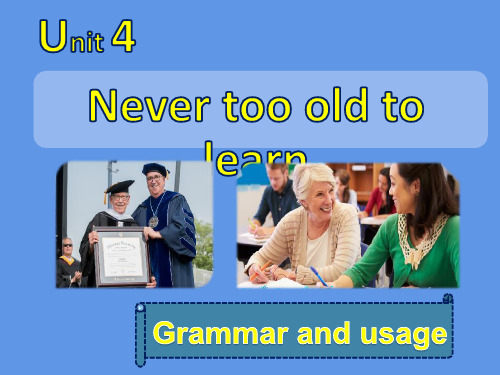
not…but…等。
“and”表并列关系
2. Shall I send the book to you, or will you come to get it?
“or”表选择关系
3. I have travelled to many places, but I still want to visit
定语从句
devote their weekends to voluntary toil in their
gardens, and when the spring comes, they
时间状语从句
experience all the joy of having created beauty.
B ARpepwlyrintegtthheeforlulolwesing sentences using proper
主语+谓语+表语 (SVP) ➢ He told us a funny story.
主语+谓语+间接宾语+直接宾语 (SVOO) ➢ I found most of my classmates and teachers
friendly and helpful. 主语A+s谓im语p+le宾s语en+t宾en补ce(SVOC) ➢ He talked too much. 主语co+谓nta语in+s状a语_s_u(_Sb_Vje_Ac_)t___ ➢ I had my first maths clasasnadt saen_io_vr_eh_rib_g_h_s_c.hool.
experience.
_______________________________________________
译林版高中英语选必一Unit4 Grammar and usage 教案
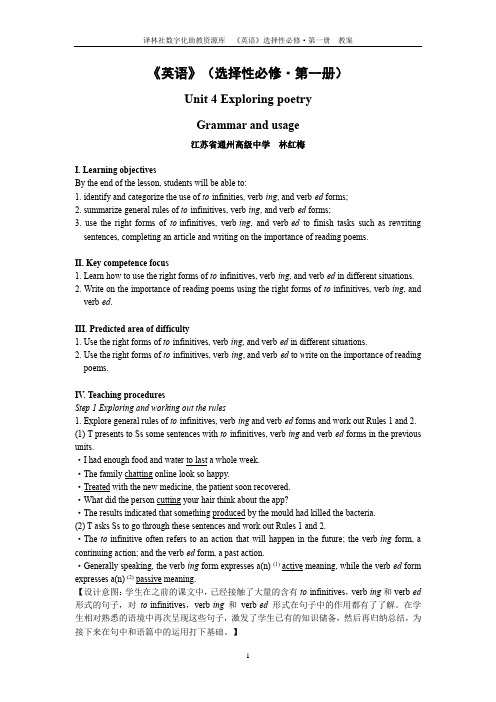
《英语》(选择性必修·第一册)Unit 4 Exploring poetryGrammar and usage江苏省通州高级中学林红梅I. Learning objectivesBy the end of the lesson, students will be able to:1. identify and categorize the use of to-infinities, verb-ing, and verb-ed forms;2. summarize general rules of to-infinitives, verb-ing, and verb-ed forms;3. use the right forms of to-infinitives, verb-ing, and verb-ed to finish tasks such as rewriting sentences, completing an article and writing on the importance of reading poems.II. Key competence focus1. Learn how to use the right forms of to-infinitives, verb-ing, and verb-ed in different situations.2. Write on the importance of reading poems using the right forms of to-infinitives, verb-ing, and verb-ed.III. Predicted area of difficulty1. Use the right forms of to-infinitives, verb-ing, and verb-ed in different situations.2. Use the right forms of to-infinitives, verb-ing, and verb-ed to w rite on the importance of reading poems.IV. Teaching proceduresStep 1 Exploring and working out the rules1. Explore general rules of to-infinitives, verb-ing and verb-ed forms and work out Rules 1 and2.(1) T presents to Ss some sentences with to-infinitives, verb-ing and verb-ed forms in the previous units.·I had enough food and water to last a whole week.·The family chatting online look so happy.·Treated with the new medicine, the patient soon recovered.·What did the person cutting your hair think about the app?·The results indicated that something produced by the mould had killed the bacteria.(2) T asks Ss to go through these sentences and work out Rules 1 and 2.·The to-infinitive often refers to an action that will happen in the future; the verb-ing form, a continuing action; and the verb-ed form, a past action.·Generally speaking, the verb-ing form expresses a(n) (1)active meaning, while the verb-ed form expresses a(n) (2)passive meaning.【设计意图:学生在之前的课文中,已经接触了大量的含有to-infinitives,verb-ing和verb-ed 形式的句子,对to-infinitives,verb-ing和verb-ed形式在句子中的作用都有了了解。
Unit4NevertoooldtolearnGrammarandUsag教案-高中英语牛津译林版(
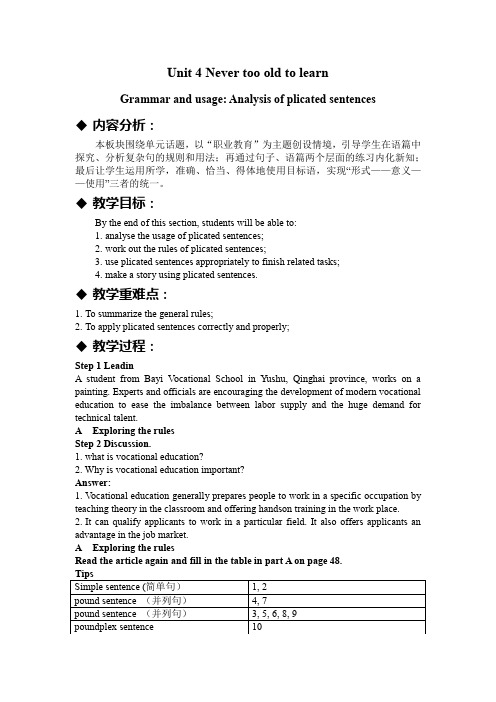
Unit 4 Never too old to learnGrammar and usage: Analysis of plicated sentences◆内容分析:本板块围绕单元话题,以“职业教育”为主题创设情境,引导学生在语篇中探究、分析复杂句的规则和用法;再通过句子、语篇两个层面的练习内化新知;最后让学生运用所学,准确、恰当、得体地使用目标语,实现“形式——意义——使用”三者的统一。
◆教学目标:By the end of this section, students will be able to:1.analyse the usage of plicated sentences;2.work out the rules of plicated sentences;e plicated sentences appropriately to finish related tasks;4.make a story using plicated sentences.◆教学重难点:1.To summarize the general rules;2.To apply plicated sentences correctly and properly;◆教学过程:Step 1 LeadinA student from Bayi V ocational School in Yushu, Qinghai province, works on a painting. Experts and officials are encouraging the development of modern vocational education to ease the imbalance between labor supply and the huge demand for technical talent.A Exploring the rulesStep 2 Discussion.1. what is vocational education?2. Why is vocational education important?Answer:1.V ocational education generally prepares people to work in a specific occupation by teaching theory in the classroom and offering handson training in the work place.2.It can qualify applicants to work in a particular field. It also offers applicants an advantage in the job market.A Exploring the rulesRead the article again and fill in the table in part A on page 48.复合句分为并列复合句pound sentence(也称并列句)和主从或从属复合句plex sentence(也称复杂句),并列复合句pound sentence是有并列连词:and、or、but连接;从属复合句plex sentence由一个主句(Principal Clause)和一个或一个以上的从句(Subordinate Clause)构成。
译林版高中英语选必三Unit4 Grammar and usage 教案

《英语》(选择性必修·第三册)Unit 4Protecting our heritage sitesGrammar and usageI. Learning objectivesBy the end of the lesson, students will be able to:1. master the form of appositive causes;2. understand the rules of appositive clauses;3. use appositive clauses to finish related tasks.II. Key competence focus1. Understand the rules of appositive clauses.2. Talk about heritage protection using appositive causes.III. Predicted area of difficultyUse appositive clauses to finish related tasks.IV. Teaching proceduresStep 1 Revising the core words and phrases learnt last periodT asks Ss to fill in the blanks with the proper forms of the (given) words.1. They ________ (awe) into silence by the seriousness of her voice.2. The girls in a class tend to have a ________ (civilize) influence on the boys.3. The most intense ________ (preserve) and restoration work is under way.4. The public is ________ (urgent) requested to assist police in tracing the murderer.5. After the earthquake, the beautiful city was ________ ruins.6. People can act ________ (violent) if they feel threatened.7. Reports ________ (conflict) on how much of the aid was reaching the famine victims.8. Julie ________ (suspend) from her job shortly after the incident.9. The ________ (asses) for the course involves written assignments and practical tests.10. The pillars gave way and a section of the roof ________ (collapse).【设计意图:上一节课核心词汇较多,有必要复习一下这些内容。
译林版高中英语必修三Unit4 Grammar and usage 教案
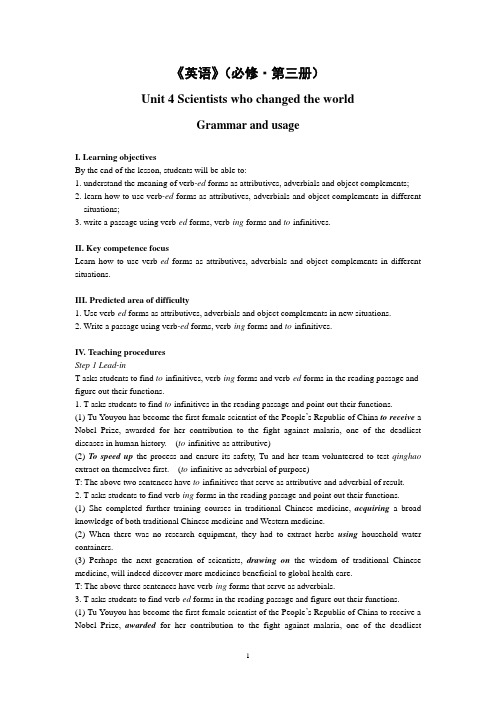
《英语》(必修·第三册)Unit 4 Scientists who changed the worldGrammar and usageI. Learning objectivesBy the end of the lesson, students will be able to:1. understand the meaning of verb-ed forms as attributives, adverbials and object complements;2. learn how to use verb-ed forms as attributives, adverbials and object complements in different situations;3. write a passage using verb-ed forms, verb-ing forms and to-infinitives.II. Key competence focusLearn how to use verb-ed forms as attributives, adverbials and object complements in different situations.III. Predicted area of difficulty1. Use verb-ed forms as attributives, adverbials and object complements in new situations.2. Write a passage using verb-ed forms, verb-ing forms and to-infinitives.IV. Teaching proceduresStep 1 Lead-inT asks students to find to-infinitives, verb-ing forms and verb-ed forms in the reading passage and figure out their functions.1. T asks students to find to-infinitives in the reading passage and point out their functions.(1) Tu Youyou has become the first female scientist of the People’s Republic of China to receive a Nobel Prize, awarded for her contribution to the fight against malaria, one of the deadliest diseases in human history. (to-infinitive as attributive)(2) To speed up the process and ensure its safety, Tu and her team volunteered to test qinghao extract on themselves first. (to-infinitive as adverbial of purpose)T: The above two sentences have to-infinitives that serve as attributive and adverbial of result. 2. T asks students to find verb-ing forms in the reading passage and point out their functions. (1) She completed further training courses in traditional Chinese medicine,acquiring a broad knowledge of both traditional Chinese medicine and Western medicine.(2) When there was no research equipment, they had to extract herbs using household water containers.(3) Perhaps the next generation of scientists, drawing on the wisdom of traditional Chinese medicine, will indeed discover more medicines beneficial to global health care.T: The above three sentences have verb-ing forms that serve as adverbials.3. T asks students to find verb-ed forms in the reading passage and figure out their functions. (1) Tu Youyou has become the first female scientist of the People’s Republic of China to receive a Nobel Prize, awarded for her contribution to the fight against malaria, one of the deadliestdiseases in human history. (verb-ed form as attributive)(2) Thanks to her discovery of qinghaosu, malaria patients all over the world now have had a greatly increased chance of survival. (verb-ed form as attributive)(3) Even with large amounts of qinghao extract produced, however, they still faced another problem. (verb-ed form as attributive)(4) Born in 1930, in Ningbo, Zhejiang Province, Tu studied medicine at university in Beijing between 1951 and 1955. (verb-ed form as adverbial)(5) Inspired by an over 1,600-year-old text about preparing qinghao extract with cold water, Tu redesigned the experiments. (verb-ed form as adverbial)T: The above five sentences have verb-ed forms that serve as attributives and adverbials.【设计意图:学生在前面两个单元的语法部分已经学习了动词不定式和动词-ing形式的用法,对本单元的阅读文章内容也已经熟悉,所以先在学生相对熟悉的语境中呈现含有动词不定式和动词-ing形式的句子,然后再呈现新的语法知识—动词-ed形式作定语和状语。
Unit+4+Grammar+and+usage+课件高中英语牛津译林版选择性必修第三册+
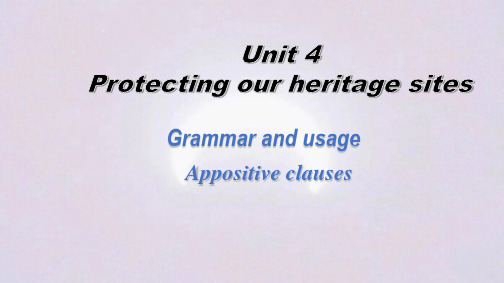
the use of a noun (phrase) or clause immediately after another noun (phrase) that refers to the same person or thing
① Mr. Smith, our new teacher, is very kind to us. ② Yesterday I met Tom, a friend of my brothers'. ③ We Chinese people are brave and hard-working. ④ The news that our team has won the game is true.
abroad soon.
2)She was in doubt _w__h_e_t_h_e_r_ she had made the right decision.
小结: that : _无___意义、_不__作___成分、_不__可____省略,只起连接作用 whether: __有___意义、_不__作___成分、__不__可___省略
been made.
小结:连接副词 _有___意义、作_状___语__成分、_不___可___省略
同位语从句的引导词
从属连词 连接代词 连接副词
引导词
用法
tich,who,who m, …+ever, whose
how, when, where, …+ ever, why
3) The couple are discussing the question _w_h_e_re_/_h_o_w they should have their honeymoon next month.
译林版高中英语扩展创新学程一Unit4 Grammar and usage 教案
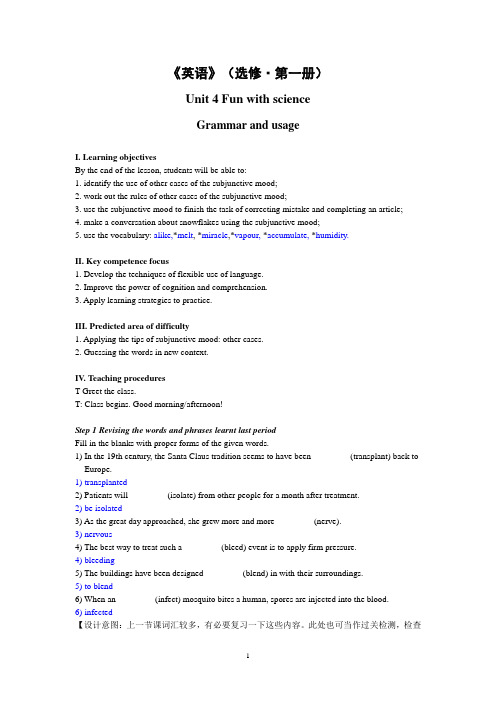
《英语》(选修·第一册)Unit 4 Fun with scienceGrammar and usageI. Learning objectivesBy the end of the lesson, students will be able to:1. identify the use of other cases of the subjunctive mood;2. work out the rules of other cases of the subjunctive mood;3. use the subjunctive mood to finish the task of correcting mistake and completing an article;4. make a conversation about snowflakes using the subjunctive mood;5. use the vocabulary: alike,*melt, *miracle,*vapour, *accumulate, *humidity.II. Key competence focus1. Develop the techniques of flexible use of language.2. Improve the power of cognition and comprehension.3. Apply learning strategies to practice.III. Predicted area of difficulty1. Applying the tips of subjunctive mood: other cases.2. Guessing the words in new context.IV. Teaching proceduresT Greet the class.T: Class begins. Good morning/afternoon!Step 1 Revising the words and phrases learnt last periodFill in the blanks with proper forms of the given words.1) In the 19th century, the Santa Claus tradition seems to have been ________ (transplant) back toEurope.1) transplanted2) Patients will ________ (isolate) from other people for a month after treatment.2) be isolated3) As the great day approached, she grew more and more ________ (nerve).3) nervous4) The best way to treat such a ________ (bleed) event is to apply firm pressure.4) bleeding5) The buildings have been designed ________ (blend) in with their surroundings.5) to blend6) When an ________ (infect) mosquito bites a human, spores are injected into the blood.6) infected【设计意图:上一节课词汇较多,有必要复习一下这些内容。
译林版高中英语必修一Unit4 Grammar and usage (I) 教案(雅礼)
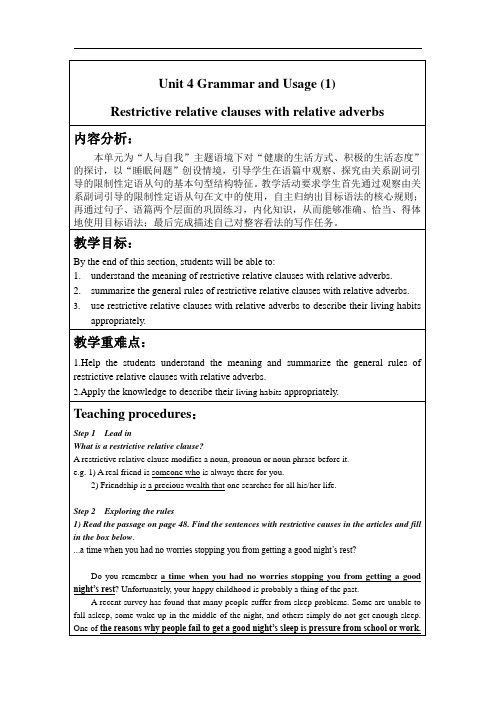
Restrictive relative clauses with relative adverbs
内容分析:
本单元为“人与自我”主题语境下对“健康的生活方式、积极的生活态度” 的探讨,以“睡眠问题”创设情境,引导学生在语篇中观察、探究由关系副词引 导的限制性定语从句的基本句型结构特征。教学活动要求学生首先通过观察由关 系副词引导的限制性定语从句在文中的使用,自主归纳出目标语法的核心规则; 再通过句子、语篇两个层面的巩固练习,内化知识,从而能够准确、恰当、得体 地使用目标语法;最后完成描述自己对整容看法的写作任务。
1.Teenagers who do not sleep well may experience situations where body development slows down, ... 2. Mike wants to work in a country where there are a lot of forests. 3. That’s the cinema where we often go and see films. Rule No.3: The relative adverb where refers to a place.
Practice Fill in the blanks with when, where and why. 1. I work in a business where almost everyone is waiting for a great chance. 2. Is that the reason why you decided to learn the piano? 3. The days are gone when we had to import everything from other countries. 4. All the neighbors admire this family where the parents are treating their child like a friend.
- 1、下载文档前请自行甄别文档内容的完整性,平台不提供额外的编辑、内容补充、找答案等附加服务。
- 2、"仅部分预览"的文档,不可在线预览部分如存在完整性等问题,可反馈申请退款(可完整预览的文档不适用该条件!)。
- 3、如文档侵犯您的权益,请联系客服反馈,我们会尽快为您处理(人工客服工作时间:9:00-18:30)。
Unit 4 Looking good, feeling goodGrammar and usage(由关系副词引导的限制性定语从句)【课前回顾】定语从句是在句子中修饰名词或者代词,充当_________ (句子成分)的句子。
被修饰的词叫O引导定语从句的关系代词,指人的有 ,指物的有 ,既能指人又能指物的是,在从句中充当定语的是。
【课前预习】1 .从书中找到以下短语(书P48-49)1.阻止某人做某事_____________________________ ________________________________2.苦于……. _________________ 3 .未能成功做某事________________________________ 4.有助于,增进,促成__________________拓展:把...捐献给..… ______________________________ 对…做出贡献(n) _______________________________________ 5.在做某事方面有困难___________拓展: ___________________ (problem)____________________________ (difficulty)6.从短期来看;就眼前来说_____________________7.从长远来看____________________8 .处于危险中_________________9. ___________________ 心脏病发作 _____________ 拓展:患.…病______________________ 向...发动攻击____________10. ___________________________________ 放慢速度;使……慢下来 ______________11 .高质量睡眠____________________________12.坚持 _______________【自主学习】1 .找出下列句子中的定语从句并在先行词下划线。
1.1will always remember the time that we spent together.2.1will always remember the time when we stayed together.3.That is the hotel that we visited last year.4.That is the hotel where we stayed last year.5.1don't believe the reason that he gave me.6.1don't know the reason why he couldn*t come.7.They are still growing, and night is the time when their bodies grow faster.8.Teenagers who do not get enough sleep may experience situations where body development slows down, and their health suffers.9.1have reached a point in my life where I am supposed to make decisions of my own.10. The reason why he failed in the exam was that he didn't study hard.归纳关系代词在定语从句中作___________________________________ (句子成分),关系副词when, where, why 引导的限制性定语从句修饰time、moment> period、occasion; house> city>country>activity>case>job>point>position> stage>situation; reason 等表示 _____________ 的先行词(或具有地点意义的抽象名词),关系副词when, where, why在从句中作________ (句子成分)。
2 .将下列句子合并为含有定语从句的主从复合句。
l.ril never forget the days . we worked together in that days.(关系代词)(关系副词)2.1went to the place . I worked in that place ten years ago._____________________________________________________________________ (关系代词)_____________________________________________________________________ (关系副词)3.This is the reason . He was late for the reason._____________________________________________________________________ (关系代词)_____________________________________________________________________ (关系副词)4.This is the time . She left for Beijing at that time._____________________________________________________________________ (关系代词)_____________________________________________________________________ (关系副词)归纳在正式场合,关系副词where> when> why在定语从句中作状语时,可以用"介词+ which" 代替。
其中when=表示 _________ 的介词(如in> at、on> during等)+which; where =表示_______ 的介词(如in、at、on、under 等)+ which; why 二表示 ___ 的介词(for 等)+which。
【合作探究】Practice一、完成Part A (书P48)o二. 完成PartB (书P49)Summary在句子中充当 _______ 的从句叫定语从句,定语从句的引导词(关系词)由先行词及其在从句中充当的成分决定,先行词在从句中充当状语时,关系词用__________________________ , 先行词在从句中充当主语、宾语、定语或表语时用____________________________________ , 当先行词在从句中充当定语时则用 _________ O【课堂检测】一、用适当的关系词填空。
1.Do you still remember the day _______ we joined the Party?2.This is the reason ______ I was late for the class.3.This is the old house _______ h is father was born fifty years ago.4.ril remember the day on _________ I was admitted to the college.5.The picture called up the days _______ we spent together.6.I've reached the stage ________ I just don't care about anything any more.7.An earthquake took place in the year _____ he was born.二、将下列句子改写为主从复合句1.What is the reason?You refused to shake hands with him just now.2.The store was broken into last night.My sister works in the store.3.The reason was that he was ill yesterday.He did not hand in his homework for that reason.4.Liu Yang will never forget the day.She was carried into space by spaceship on that day.5.The English play was a great success.The students acted in it at the New Year's party.三、用定语从句将文章补充完整。
Dear Tom,Nice to read your e-mail today. I noticed you have begun to use Chinese idioms and used most of them correctly.However, Tm afraid there is 1 (一个我想指出来的错误)It is the idiom "无所不为",2 (他的意思是“做各种各样的坏事”)Are you doing all kinds of bad things at home? I guess the idea 3 (你真正想说的)is that you have got nothing to do these days. In that case, you should use “无所事事We usually use "无所不为"to express the idea that people dare to do anything bad, and "无所事事"to describe the situation 4 (人们没有有意义的事情可做).Have I made myself clear?Anyway, I'm amazed at the progress 5 .(你已经取得的)Hope you'll find a job soon.Yours,Li Hua1.__________________________________________________________________2._________________________________________________________________3._________________________________________________________________4._________________________________________________________________5._________________________________________________________________【课后思考】限制性定语从句能否去掉?去掉后句子结构是否完整?句子意思是否清晰?。
